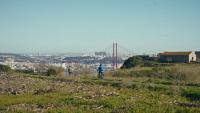 The film’s fertile terrain lies in the interstitial spaces between li (here) and lá (there), in the liminal lives and livelihoods, between memory and present, between those who arrived and those born here but carrying another land with them, between a country that calls itself modern and the persistence of underserved informal settlements that persist — despite decades of promises of dignified and universal rehousing — as mirages on the periphery. Rather than an ethnographic outsider’s look, Ali, Aqui proposes a wandering story told from within, a community fiction rather than a docu-drama, based on the rhythms, languages, emotions, textures, pains, and humours of those who inhabit the community.
The film’s fertile terrain lies in the interstitial spaces between li (here) and lá (there), in the liminal lives and livelihoods, between memory and present, between those who arrived and those born here but carrying another land with them, between a country that calls itself modern and the persistence of underserved informal settlements that persist — despite decades of promises of dignified and universal rehousing — as mirages on the periphery. Rather than an ethnographic outsider’s look, Ali, Aqui proposes a wandering story told from within, a community fiction rather than a docu-drama, based on the rhythms, languages, emotions, textures, pains, and humours of those who inhabit the community.
Afroscreen
17.11.2025 | by Pedro José-Marcellino aka P.J. Marcellino
 It is this historical context of political exchanges and utopias that inspired Zineb Sedira to develop Standing Here Wondering Which Way To Go, a multimedia project that delves into emancipatory dreams, transnational networks and conviviality. Borrowing its title from a song performed by African-American singer Marion Williams at the Pan African Festival of Algiers, the exhibition pays homage to the spirit of solidarity and resistance of the global 1960s which was so present in newly independent Algeria. Divided into four ‘scenes’, the project also celebrates culture in its diverse forms as a vital tool for social mobilisation and political consciousness.
It is this historical context of political exchanges and utopias that inspired Zineb Sedira to develop Standing Here Wondering Which Way To Go, a multimedia project that delves into emancipatory dreams, transnational networks and conviviality. Borrowing its title from a song performed by African-American singer Marion Williams at the Pan African Festival of Algiers, the exhibition pays homage to the spirit of solidarity and resistance of the global 1960s which was so present in newly independent Algeria. Divided into four ‘scenes’, the project also celebrates culture in its diverse forms as a vital tool for social mobilisation and political consciousness.
I'll visit
13.11.2025 | by Amanda Tavares
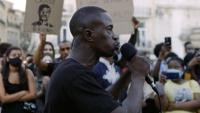 No seu acto final, Complô não poupa socos, mas vai com luvas de lã. De volta ao estúdio –– esse refúgio improvisado entre blocos de prédios algures na Margem Sul – pressentimos a mudança de tom. A raiva dá lugar à ternura, talvez porque a ternura sejá mais poderosa. Ghoya grava uma faixa para a companheira. A sua voz abranda, amacia. “Baby, nós merecíamos um filme,” ele diz.
No seu acto final, Complô não poupa socos, mas vai com luvas de lã. De volta ao estúdio –– esse refúgio improvisado entre blocos de prédios algures na Margem Sul – pressentimos a mudança de tom. A raiva dá lugar à ternura, talvez porque a ternura sejá mais poderosa. Ghoya grava uma faixa para a companheira. A sua voz abranda, amacia. “Baby, nós merecíamos um filme,” ele diz.
Afroscreen
02.11.2025 | by Pedro José-Marcellino aka P.J. Marcellino
 Cléo Diára signs a historic role here. Not as a token of diversity on a European poster, but because she carries in her the contradiction of her POV, never throwing it back at the viewer as pedagogy. She’s simply magnetic, sensitive, at times insolent, provocative; or as a NYFF text puts it, she “mixes strength, sensuality, and vulnerability” and stands out as the film’s emotional backbone. It’s no surprise she won the Best Actress Award in Cannes’ Un Certain Regard section, a gesture of resonance for a Capeverdean-Portuguese actress working in a circuit where legitimacy is still a bareknuckle spar. Those New York critics went further: a “fierce” and “star-making” role. All true.
Cléo Diára signs a historic role here. Not as a token of diversity on a European poster, but because she carries in her the contradiction of her POV, never throwing it back at the viewer as pedagogy. She’s simply magnetic, sensitive, at times insolent, provocative; or as a NYFF text puts it, she “mixes strength, sensuality, and vulnerability” and stands out as the film’s emotional backbone. It’s no surprise she won the Best Actress Award in Cannes’ Un Certain Regard section, a gesture of resonance for a Capeverdean-Portuguese actress working in a circuit where legitimacy is still a bareknuckle spar. Those New York critics went further: a “fierce” and “star-making” role. All true.
Afroscreen
26.10.2025 | by Pedro José-Marcellino aka P.J. Marcellino
 These names are part of a list, whose same logic inspired another list composed of the names of several children from a Portuguese public school to be read by the Portuguese (neo) colonial-fascist party in Parliament, which exposed these same children to hatred and violence (in Portugal as in Palestine). The list I have partly copied above is a document, perhaps a list of those arriving in a slave ship, which the Portuguese filmmaker Dulce Fernandes included in her latest film, Tales of Oblivion.
These names are part of a list, whose same logic inspired another list composed of the names of several children from a Portuguese public school to be read by the Portuguese (neo) colonial-fascist party in Parliament, which exposed these same children to hatred and violence (in Portugal as in Palestine). The list I have partly copied above is a document, perhaps a list of those arriving in a slave ship, which the Portuguese filmmaker Dulce Fernandes included in her latest film, Tales of Oblivion.
Afroscreen
21.10.2025 | by Inês Beleza Barreiros
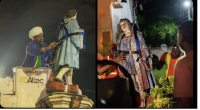 To understand Trinidad, there can be no fixed, predetermined “root identity” in the traditional, categorical sense. The island’s culture claims its right to opacity, resisting simplification, even while its core remains Creole. Too many people, too many cultures have met - and clashed - across its ports and borders. For this reason, Trinidad cannot be singular; it is plural, maternal. Like a mother, it tells stories, at first misunderstood by its children, yet always offering a lesson. Like a mother, it lets its children wander before calling them back to the tropics. This island is a birth of worlds.
To understand Trinidad, there can be no fixed, predetermined “root identity” in the traditional, categorical sense. The island’s culture claims its right to opacity, resisting simplification, even while its core remains Creole. Too many people, too many cultures have met - and clashed - across its ports and borders. For this reason, Trinidad cannot be singular; it is plural, maternal. Like a mother, it tells stories, at first misunderstood by its children, yet always offering a lesson. Like a mother, it lets its children wander before calling them back to the tropics. This island is a birth of worlds.
To read
01.09.2025 | by Carlotta Pisano
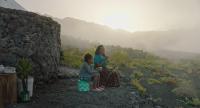 This is one of those rare films that doesn’t penetrate your soul through the eyes but rather seeps in through your skin. It lingers in the inherited silences, it speaks through whispered gestures, it resurfaces in the anguished absences in our own lived experience. With the languid rhythm of a dry wind ascending the steep slope of a volcano to reach its plateau at sunset, and gently cool it for the night, this masterful feature doesn’t attempt to explain feelings. Instead, it gently offers a sense of belonging and, for us in the Capeverdean diaspora, a tableau of memory.
This is one of those rare films that doesn’t penetrate your soul through the eyes but rather seeps in through your skin. It lingers in the inherited silences, it speaks through whispered gestures, it resurfaces in the anguished absences in our own lived experience. With the languid rhythm of a dry wind ascending the steep slope of a volcano to reach its plateau at sunset, and gently cool it for the night, this masterful feature doesn’t attempt to explain feelings. Instead, it gently offers a sense of belonging and, for us in the Capeverdean diaspora, a tableau of memory.
Afroscreen
08.08.2025 | by Pedro José-Marcellino aka P.J. Marcellino
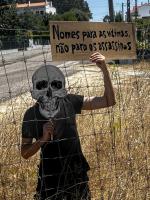 The art group The Party of the Dead was formed in Russia in 2017; its members have created numerous performances, working with the theme of the necropolitics of Putin's regime and his party. In one interview, artist and group member Ivan Zagibly describes the situation in Russia as follows: "Dictatorship does not come instantly; it takes twenty years. First, the media comes under the complete control of the party, then the courts and the legislature; NGOs are shut down; new laws restricting rights are passed; independent internet resources are blocked; the number of political prisoners grows. Most people don't notice this: the economy is growing, salaries are rising, everyone is getting used to it. It's like alcoholism: at first, it becomes normal to drink every day, then for weeks at a time, then to live in short, gloomy intervals between binges.
The art group The Party of the Dead was formed in Russia in 2017; its members have created numerous performances, working with the theme of the necropolitics of Putin's regime and his party. In one interview, artist and group member Ivan Zagibly describes the situation in Russia as follows: "Dictatorship does not come instantly; it takes twenty years. First, the media comes under the complete control of the party, then the courts and the legislature; NGOs are shut down; new laws restricting rights are passed; independent internet resources are blocked; the number of political prisoners grows. Most people don't notice this: the economy is growing, salaries are rising, everyone is getting used to it. It's like alcoholism: at first, it becomes normal to drink every day, then for weeks at a time, then to live in short, gloomy intervals between binges.
Mukanda
04.08.2025 | by Partido dos Mortos
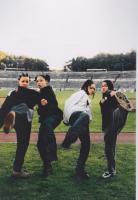 I think it was really a mixture from the beginning but black teenagers from all the African ex-colonies, marginalised people, recognised themselves in the lyrics of American groups that talked about racism and social injustice, which they experienced in the US.
But since the beginning, white kids that were in school with these black communities liked the music, the attitude, the aesthetic and began to rap. So, it was a mixture from the beginning. General D, the first rapper to release an album in Portugal has Mozambican origins, for example. Nelson Neves, who is an important person in the film, was the one who brought the music from Paris because he spent vacations there, and he's the son of Cape Verdean parents. In Rapública you have white artists like Líderes de Nova Mensagem, which was a band that had black and white musicians, rappers and DJs, and they're from Almada.
I think it was really a mixture from the beginning but black teenagers from all the African ex-colonies, marginalised people, recognised themselves in the lyrics of American groups that talked about racism and social injustice, which they experienced in the US.
But since the beginning, white kids that were in school with these black communities liked the music, the attitude, the aesthetic and began to rap. So, it was a mixture from the beginning. General D, the first rapper to release an album in Portugal has Mozambican origins, for example. Nelson Neves, who is an important person in the film, was the one who brought the music from Paris because he spent vacations there, and he's the son of Cape Verdean parents. In Rapública you have white artists like Líderes de Nova Mensagem, which was a band that had black and white musicians, rappers and DJs, and they're from Almada.
Face to face
13.07.2025 | by Graham Douglas
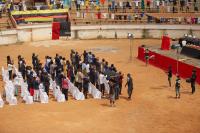 This condition ensured that we took on the production of the film without fear of making mistakes and also as an antidote to the idleness and uncertainty of the future. A good example is the stadium scene: when I wrote it, I imagined a crowd, but then Covid arrived and we couldn't even fit five people in. I was never afraid, because I know that reality and this mixture of magic forced me to find other ways of representing the same feeling. I know it may sound theoretical, but I think it's very real and rational. Because we're used to living like this in Angola. We have to make do with what we have, even for movies.
This condition ensured that we took on the production of the film without fear of making mistakes and also as an antidote to the idleness and uncertainty of the future. A good example is the stadium scene: when I wrote it, I imagined a crowd, but then Covid arrived and we couldn't even fit five people in. I was never afraid, because I know that reality and this mixture of magic forced me to find other ways of representing the same feeling. I know it may sound theoretical, but I think it's very real and rational. Because we're used to living like this in Angola. We have to make do with what we have, even for movies.
Afroscreen
09.06.2025 | by Marta Lança
 A lifetime of bleeding and crying. A lifetime of undoing the body to understand the body, to receive the body. This is configured in many ways. A woman disconnected from her womanhood loses her hair, loses her scales, becomes a porpoise. And a porpoise is a man, even if it’s a fish, and even if it’s female. A thing, ladies and gentlemen, is a thing. The other is a porpoise, and a porpoise is a porpoise, a woman is a woman, one is slippery and the other isn’t.
A lifetime of bleeding and crying. A lifetime of undoing the body to understand the body, to receive the body. This is configured in many ways. A woman disconnected from her womanhood loses her hair, loses her scales, becomes a porpoise. And a porpoise is a man, even if it’s a fish, and even if it’s female. A thing, ladies and gentlemen, is a thing. The other is a porpoise, and a porpoise is a porpoise, a woman is a woman, one is slippery and the other isn’t.
Body
04.06.2025 | by Manuella Bezerra de Melo
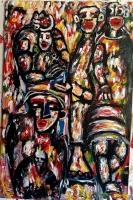 Dear racialized friend, we both feel the weight, so let me end here as it’s getting late, when we talk about racism, whiteness and privilege, don't ever forget to create contexts, don't repeat the same claims as if they were refrains, don't talk about the system as if it operated and oppressed in the same way everywhere, with no aims or changes or such affairs, or as if the context of blacks in the USA was the same as that of blacks in Portugal, and of blacks in Brazil, and from there to blacks in Guinea.
Dear racialized friend, we both feel the weight, so let me end here as it’s getting late, when we talk about racism, whiteness and privilege, don't ever forget to create contexts, don't repeat the same claims as if they were refrains, don't talk about the system as if it operated and oppressed in the same way everywhere, with no aims or changes or such affairs, or as if the context of blacks in the USA was the same as that of blacks in Portugal, and of blacks in Brazil, and from there to blacks in Guinea.
To read
04.06.2025 | by Marinho de Pina
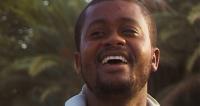 I also think his music is quite special, and he was a very special person. He was very generous, doing a lot of social work, working with street children. He was very engaged in working for a society in the ‘90s that was starting to develop its own independence, since it was formally declared in 1974. It's not just his music, it's also the way he uses stories about the people that live in Santiago, in the interior and rural areas of the island.
I also think his music is quite special, and he was a very special person. He was very generous, doing a lot of social work, working with street children. He was very engaged in working for a society in the ‘90s that was starting to develop its own independence, since it was formally declared in 1974. It's not just his music, it's also the way he uses stories about the people that live in Santiago, in the interior and rural areas of the island.
Face to face
28.05.2025 | by Graham Douglas
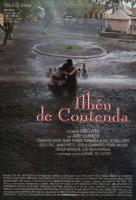 It’s about contesting narratives: not only narratives about Africa, Africans, Capeverdeans, and about our diverse perspectives, but also narratives about what cinema is, and what it can be, who gets to watch and be watched, who gets to speak and be heard. It is slow but necessary work. It is the work of re-inscribing our collective imagination with images that belong to us and that, in turn, transform us, and then the world.
It’s about contesting narratives: not only narratives about Africa, Africans, Capeverdeans, and about our diverse perspectives, but also narratives about what cinema is, and what it can be, who gets to watch and be watched, who gets to speak and be heard. It is slow but necessary work. It is the work of re-inscribing our collective imagination with images that belong to us and that, in turn, transform us, and then the world.
Afroscreen
29.04.2025 | by Pedro José-Marcellino aka P.J. Marcellino
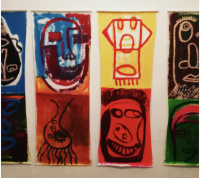 The Black body is one of the boring, limiting terms that abound in decolonial discourse. The fact that it is an unknown or almost unknown term in Guinea-Bissau (I’ve no idea if I need statistics to say this), makes me wonder: how do you decolonize Africa without Africans being involved?
The Black body is one of the boring, limiting terms that abound in decolonial discourse. The fact that it is an unknown or almost unknown term in Guinea-Bissau (I’ve no idea if I need statistics to say this), makes me wonder: how do you decolonize Africa without Africans being involved?
To read
22.04.2025 | by Marinho de Pina
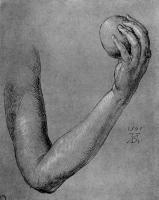 What is a person? It's a threshold question, as if it could only be asked in the passage between an end and a beginning, at a moment when the list of the virtues of human existence is exhausted, dries up, and we finally see that what we thought was properly human is, after all, shared with other beings. In its tendency to move away from purist differentiations governed by exclusive properties, science not only fails to offer this guarantee, but has contributed to shattering the logic of unity, of restriction, of what is, in short, singular.
What is a person? It's a threshold question, as if it could only be asked in the passage between an end and a beginning, at a moment when the list of the virtues of human existence is exhausted, dries up, and we finally see that what we thought was properly human is, after all, shared with other beings. In its tendency to move away from purist differentiations governed by exclusive properties, science not only fails to offer this guarantee, but has contributed to shattering the logic of unity, of restriction, of what is, in short, singular.
Body
19.04.2025 | by Marta Rema
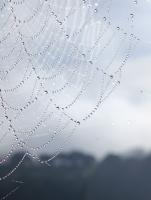 I kept my grip on the spot, my feet firmly rooted, almost glued to it. I needed to propel myself forward, but I didn't know how. As if my body had forgotten one of its capabilities. I couldn't even understand if the urge I felt was rational or if it was coming from my gut, or from the voices I heard urging me to fall, because the body was resisting and, when the body resists, we must listen to it, accept that resistance, that insistence on self-preservation.
I kept my grip on the spot, my feet firmly rooted, almost glued to it. I needed to propel myself forward, but I didn't know how. As if my body had forgotten one of its capabilities. I couldn't even understand if the urge I felt was rational or if it was coming from my gut, or from the voices I heard urging me to fall, because the body was resisting and, when the body resists, we must listen to it, accept that resistance, that insistence on self-preservation.
I'll visit
19.04.2025 | by Liliana Coutinho
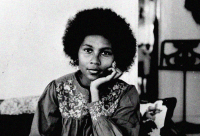 The author argues that racism and sexism, institutionalized as patriarchy, are at the base of the social structure, in this case in the United States, but can be extrapolated to many other societies, such as our own. By criticizing the various feminisms that have left out the experiences and social places of black women, she shows how they have had to carve out their own path of resistance. T
The author argues that racism and sexism, institutionalized as patriarchy, are at the base of the social structure, in this case in the United States, but can be extrapolated to many other societies, such as our own. By criticizing the various feminisms that have left out the experiences and social places of black women, she shows how they have had to carve out their own path of resistance. T
Body
01.04.2025 | by Marta Lança
 Maybe that's the secret of satire: behaving like Schrödinger's cat: for every side that wants it dead, there's an opposite side that keeps it alive. But this is just a maybe, I barely know enough about humor, let alone physics, to know if the metaphor is actually applicable.
Maybe that's the secret of satire: behaving like Schrödinger's cat: for every side that wants it dead, there's an opposite side that keeps it alive. But this is just a maybe, I barely know enough about humor, let alone physics, to know if the metaphor is actually applicable.
I'll visit
01.04.2025 | by Pedro Goulão
 Jasse considers how the various European colonial projects shared the similar aim, for which they competed, of access to all sorts of resources for the economic benefit of their elites – a reality that, now being propelled under new globalized guises by new (alongside the same old) agents of so-called progress and development, is far from over.
Jasse considers how the various European colonial projects shared the similar aim, for which they competed, of access to all sorts of resources for the economic benefit of their elites – a reality that, now being propelled under new globalized guises by new (alongside the same old) agents of so-called progress and development, is far from over.
I'll visit
25.03.2025 | by Ana Balona de Oliveira